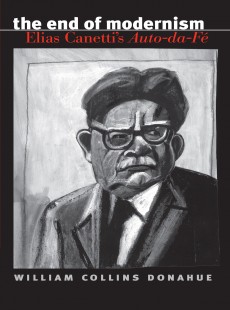The End of Modernism
Elias Canetti's Auto-da-Fé
William Collins Donahue



 Publisher: University of North Carolina Press
Publisher: University of North Carolina Press
Imprint: University of North Carolina at Chapel Hill Department of Germanic and Slavic Languages and Literatures
Published: 01/2003
Pages: 304
Subject: Literary Criticism, Philosophy
| University of North Carolina
Print ISBN: 9780807881248
eBook ISBN: 9780807875223
DESCRIPTION
Nobel laureate Elias Canetti wrote his novel Auto-da-Fe
(Die Blendung) when he and the twentieth century were still
quite young. Rooted in the cultural crises of the Weimar period,
Auto-da-Fe first received critical acclaim abroad--in
England, France, and the United States--where it continues to
fascinate readers of subsequent generations. Critical reactions
have abounded, but never has a comprehensive study placed this work
in its cultural and philosophical contexts. The End of
Modernism seeks to do just that, situating the novel not only
in relation to Canetti's considerable body of social thought, but
also within larger debates on Freud and Freudianism, misogyny and
modernism's "fragmented subject," racial anti-Semitism and the
failure of humanism, contemporary philosophy and philosophical
fads, and traditionalist notions of literature and escapist
conceptions of history. The End of Modernism portrays
Auto-da-Fe as an exemplum of "analytic modernism," and in
this sense a crucial endpoint in the progression of postwar
conceptions of literary modernism.

 Publisher: University of North Carolina Press
Publisher: University of North Carolina Press


